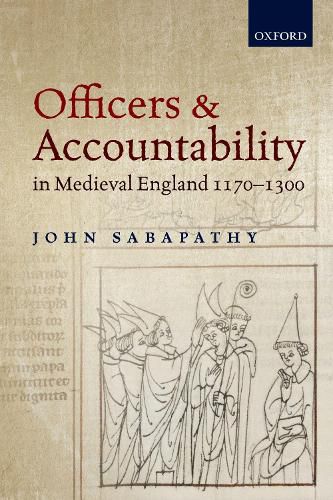Readings Newsletter
Become a Readings Member to make your shopping experience even easier.
Sign in or sign up for free!
You’re not far away from qualifying for FREE standard shipping within Australia
You’ve qualified for FREE standard shipping within Australia
The cart is loading…






The later twelfth and thirteenth centuries were a pivotal period for the development of European government and governance. A mentality emerged that trusted to procedures of accountability as a means of controlling officers’ conduct. The mentality was not inherently new, but it became qualitatively more complex and quantitatively more widespread in this period, across European countries, and across different sorts of officer. The officers exposed to these methods were not just ‘state’ ones, but also seignorial, ecclasistical, and university-college officers, as well as urban-communal ones. This study surveys these officers and the practices used to regulate them in England. It places them not only within a British context but also a wide European one and explores how administration, law, politics, and norms tried to control the insolence of office.The devices for institutionalising accountability analysed here reflected an extraordinarily creative response in England, and beyond, to the problem of complex government: inquests, audits, accounts, scrutiny panels, sindication. Many of them have shaped the way in which we think about accountability today. Some remain with us. So too do their practical problems. How can one delegate control effectively? How does accountability relate to responsibility? What relationship does accountability have with justice? This study offers answers for these questions in the Middle Ages, and is the first of its kind dedicated to an examination of this important topic in this period.
$9.00 standard shipping within Australia
FREE standard shipping within Australia for orders over $100.00
Express & International shipping calculated at checkout
The later twelfth and thirteenth centuries were a pivotal period for the development of European government and governance. A mentality emerged that trusted to procedures of accountability as a means of controlling officers’ conduct. The mentality was not inherently new, but it became qualitatively more complex and quantitatively more widespread in this period, across European countries, and across different sorts of officer. The officers exposed to these methods were not just ‘state’ ones, but also seignorial, ecclasistical, and university-college officers, as well as urban-communal ones. This study surveys these officers and the practices used to regulate them in England. It places them not only within a British context but also a wide European one and explores how administration, law, politics, and norms tried to control the insolence of office.The devices for institutionalising accountability analysed here reflected an extraordinarily creative response in England, and beyond, to the problem of complex government: inquests, audits, accounts, scrutiny panels, sindication. Many of them have shaped the way in which we think about accountability today. Some remain with us. So too do their practical problems. How can one delegate control effectively? How does accountability relate to responsibility? What relationship does accountability have with justice? This study offers answers for these questions in the Middle Ages, and is the first of its kind dedicated to an examination of this important topic in this period.